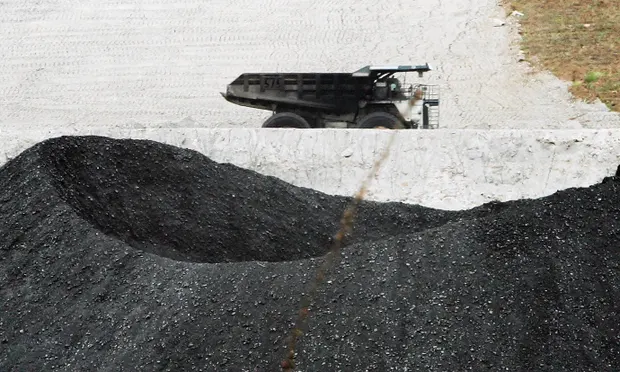Fidelity- Running down coal mines beats selling them for real-world carbon impact
Mining is a good example of the complexities involved in decarbonisation. As some miners opt to sell coal assets, BHP is instead winding down one of its Australian mines. Discover why we are applauding this decision.

Key points
- Selling fossil fuel producing assets can improve a business’ carbon impact. However, private buyers often exploit these assets, leading to a real-world increase in carbon emissions.
- We advocate for responsible asset run downs, rather than divestment, with clear timelines for closure and with funds committed to support a just transition for impacted communities.
- We are engaging not only with miners, but right across the coal value chain to encourage real-world decarbonisation. This encompasses utilities and even intermediaries like transport operators.
“Would that it were so simple,” spits an increasingly exasperated Ralph Fiennes in the Coen Brothers’ film ‘Hail Caesar.’ And many companies trying to improve their sustainability might be forgiven, at times, for feeling the same way. Even seemingly straightforward ESG decisions can be fraught with unforeseen or unintended consequences.
The fate of a coal mine in Australia is a good example. It’s owned by BHP Group, the world’s largest mining company, which had signalled it would sell off the Mount Arthur thermal coal mine as part of its programme of decarbonisation. It has now reversed that decision and will extend its licence to operate from 2026 to 2030, thereby extracting huge volumes of coal. So why do we applaud the decision?
Divestment is not the answer
Some miners, including BHP, have sold out of their coal assets in response to pressure from advocacy groups and some shareholders. While selling a mine can reduce an individual company’s value chain emissions, it does not guarantee a positive impact in the real world. Around US$60bn of fossil fuel assets have been sold to private buyers in the last two years alone. These facilities continue to operate, but usually with less transparency and weaker controls around environmental and social impacts than those in public markets. Instead, our preference is for companies to commit to responsible asset run downs, rather than divestment, with clear timelines for closure and with funds committed to support a just transition.
That is what BHP Group intends at Mount Arthur, winding down the mine to closure in 2030, far sooner than if it had been sold on to a private operator, which would have run well into the 2040s - beyond the International Energy Authority’s recommended 2030 closure of ‘unabated’ OECD coal power. The temporary boost to BHP’s carbon tally will, in fact, cut real world emissions over the long term.
Sustainability extends beyond environmental concerns, of course. Coal mining plays a major role in the economy of the Hunter Valley. The Mount Arthur mine supports 2000 jobs and a further 16,000 people are directly employed by the coal industry across the region. BHP says it will invest around US$700m to support employees as mining ends, and to rehabilitate the site. This plan is aligned with our commitment to a just transition, providing security and clarity to communities affected by the closure.
Paul Taylor, a Fidelity portfolio manager, has had close engagement with BHP over many years and has discussed the complexity around the Hunter Valley decision. “Of all the options around Mount Arthur,” he says, “BHP’s proposal is the best, most sensible to deliver a just transition.”
Engaging to support transition
We continue to have dialogue with managers at BHP on how it intends to manage risks around decarbonisation at Mount Arthur and far beyond. As the world’s largest listed mining group, it has a major role to play, not least because some of the materials the company extracts, such as copper, will play an important role in the green transition.
We are also engaging not only with other miners, but right across the coal value chain to encourage real-world decarbonisation, encompassing utilities and even intermediaries like transport operators. As with BHP, we encourage them to commit to their part in an orderly phaseout of unabated capacity, and that companies should identify and encourage best practices with respect to a just transition. A strategy of active engagement helps us, as investors, monitor the development of these transition plans and hold companies to account on their progress.
Selling or suddenly shutting coal mines can flatter owners’ emissions but puts the assets out of the reach of these engagement principles. Would that it were so simple, you might say.
Important Information:
This information is for investment professionals only and should not be relied upon by private investors. Past performance is not a reliable indicator of future returns. Investors should note that the views expressed may no longer be current and may have already been acted upon. Changes in currency exchange rates may affect the value of investments in overseas markets. Investments in emerging markets can be more volatile than in other more developed markets. Fidelity’s range of equity funds can use financial derivative instruments for investment purposes, which may expose them to a higher degree of risk and can cause investments to experience larger than average price fluctuations. A focus on securities of companies which maintain strong environmental, social and governance (“ESG”) credentials may result in a return that at times compares unfavourably to similar products without such focus. No representation nor warranty is made with respect to the fairness, accuracy or completeness of such credentials. The status of a security’s ESG credentials can change over time. Reference in this document to specific securities should not be interpreted as a recommendation to buy or sell these securities and is only included for illustration purposes.
_______________________________________________________________________
For more information about Fidelity International visit www.fidelityinternational.com/
August 2022
Please note that these are the views of Matthew Jennings of Fidelity International and should not be interpreted as the views of RL360.
